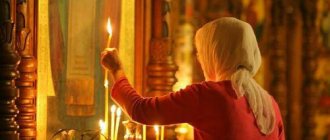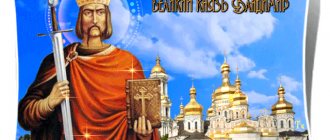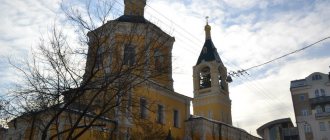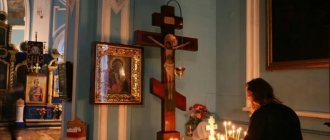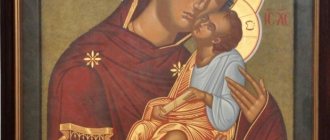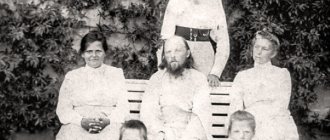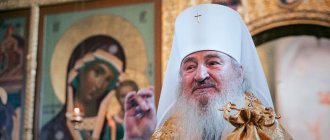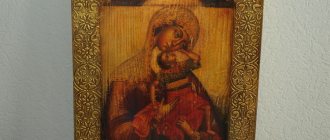"Save me, God!".
Thank you for visiting our website, before you start studying the information, please subscribe to our Orthodox community on Instagram, Lord, Save and Preserve † - https://www.instagram.com/spasi.gospodi/. The community has more than 400,000 subscribers. There are many of us like-minded people and we are growing quickly, we post prayers, sayings of saints, prayer requests, and timely post useful information about holidays and Orthodox events... Subscribe. Guardian Angel to you!
Good afternoon, brothers and sisters. We ask you to subscribe to our Orthodox page on Instagram https://www.instagram.com/spasi.gospodi/. We lead it with soul and we already have more than 400,000 subscribers. Join us. Guardian angel to you!
Saint Alexis, the man of God, became an example of humility and tolerance. He always said that you should believe in the Lord and take care of spiritual purity. Attachment to money and other material objects sometimes pushes people to the most cruel acts. They still turn to him often today.
Life of Saint Alexy
The boy grew up very pious: he strictly observed fasting, was generous in alms, and secretly wore a hair shirt under his rich clothes. Already in his young years, he wanted to leave worldly life for the sake of serving God, but his parents decided to marry him. However, in the evening after the wedding, Alexey gave his ring to the bride, announced that he had decided to devote his life to God’s service and, disguised as a commoner, left home.
On the ship, Alexy sailed to Mesopotamia, and from there he reached Edessa, where in the Church of the Most Holy Theotokos there was a shroud with the Image of Christ Not Made by Hands. Here, on the porch, he stayed, selling everything he still had and distributing the proceeds to the poor. Alexy lived on bread and water, and he gave all the alms that were given to him to the sick and infirm. He devoted all his time to prayers. The strict fast he imposed on himself changed his appearance so much that even the servants sent to search by his inconsolable parents did not recognize him. The servants gave alms to Alexy, not recognizing him as their master.
So 17 years passed, until one day the sexton of the church, on the porch of which Alexy was begging, received a command from the icon of the Mother of God: to introduce into her church “a man of God, worthy of the Kingdom of Heaven,” on whom the Holy Spirit rests. After a long search, the sexton appealed to the icon, asking him to point out such a person, and the icon announced that the beggar on the porch was the man of God.
The sexton fulfilled the command of the Mother of God and led Alexy into the church. This incident became known, and many began to revere Alexy as a righteous man. He, in order to avoid fame, secretly sailed on a ship to Cilicia. However, God's providence intervened: due to a storm, the ship was washed up on the Italian coast. Relying on God's will, he went on foot to Rome, to his parents' house, and asked for shelter. So, unrecognized, he returned to his father’s house, where his father showed mercy, allocated a place for him in the entryway, and ordered him to be fed with food from his table.
However, Alexy continued his ascetic life here: he still fasted and prayed day and night, humbly enduring ridicule from the servants because of this. Often at night he heard the sobs of his mother and bride, who remained in their house, and experienced unbearable torment from this, but his love for the Lord helped him endure it.
So another 17 years passed, during which Alexy continued to lead an ascetic life. The Lord notified him in advance about the day of his death, and Alexy, taking the charter (papyrus paper), left his life story on it, asking for forgiveness from his relatives.
On the day when the Monk Alexy died, during the liturgy served by Pope Innocent in the presence of Emperor Honorius, a Voice from the altar announced: “Find the man of God departing into eternal life, let him pray for the city.” Everyone felt such fear that they threw themselves on their faces. They searched the entire city, but the search for the righteous did not yield any results. During the all-night vigil, the Pope turned to the Lord with a request to point out such a righteous person, and this time the Voice answered that one should look for such a person in the house of Euthymian.
When they arrived there, they found Alexy already dead, but with a luminous face and with a charter clutched in his hand. All attempts to get her out were unsuccessful. And only when the kneeling Pope and the Emperor turned to the deceased, as if he were alive, with a request to unclench his hand, it unclenched, and they could read the charter. The parents and the bride, sobbing, bowed to the remains of the righteous man.
The body of the man of God on a richly decorated bed was displayed in the square. People immediately reached out to her, and healings began to occur. Even after the emperor and the Pope transferred the body to the church, and a week later placed it in a marble tomb, it continued to smell like peace and give healing to the suffering.
We recommend reading: Icon of the Holy Martyr Galina
The fate of the saint's relics
Many people cried at the sight of such an event. The bed with the body of Saint Alexius was placed in Rome in the central square. People began to flock to him to be cleansed and relieved of their ailments. The dumb began to speak, the blind began to see, the possessed and the mentally ill were cured. Seeing such miracles, Emperor Honorius and Pope Innocent I themselves carried the body of the saint in the funeral procession. The honorable remains of Saint Alexis, the man of God, were buried on March 17, 411 in the same church in the name of St. Boniface on the Aventine Hill in Rome, where he was married.
In 1216, the relics of the saint were found and placed under the main altar of the temple, which, having been expanded, began to be named in honor of two saints - Boniface and Alexy. Relics of St. Alexia were divided: the head rests in the Greek monastery of the Great Lavra in the city of Kalavryta (according to legend, it was donated to the monastery by Emperor Manuel II), in the Novgorod Cathedral of St. Sophia the hand of the saint was kept in a silver gilded ark in front of the main iconostasis of the cathedral, on the left side of the royal gates, but with Soviet power's relics disappeared.
As in Europe, in Rus' many spiritual poems were dedicated to Alexy the man of God. The veneration of the saint was especially noticeable during the reign of Sovereign Alexei Mikhailovich, whose heavenly patron was St. Alexy. This Roman beggar righteous man became for Russians a symbol of renunciation of temporary earthly material goods, an image of humility, meekness and non-covetousness, for which God rewards with the grace of holiness, the special power of prayer and the gift of miraculous intercession for those who turn to him as a “Defender”.
In the homeland of St. Alexy now his memory is consigned to oblivion. As part of the liturgical reform undertaken after the Second Vatican Council, the feast of St. Alexius the Man of God was excluded from the new edition of the General Roman Calendar (1969). The memory of Saint Alexy on July 17 (NS) at mass is celebrated only in churches and monastic orders associated with this saint, for example, in the Catholic order of Alexians, whose patron is Saint Alexy. The reason for the exclusion of St. Alexy from the Catholic calendar was due to the “legendary nature of his life, not confirmed by modern sources.”
Photographs (2005)
: In the Roman Church of St. Boniface and Alexis, a staircase was installed, under which “according to legend” (as it is written on the tablet) St. lived. Alexy, and below it is his plaster sculpture. The relics are still in the tomb (behind bars) in the altar part of the temple, but there is no access to them and the employees explain to the Russian pilgrims: “These are just bones! And why do you worship them?..” To the right of the main altar there is a special chapel where the Edessa miraculous icon of the Mother of God is placed, brought here from the East at the end of the 10th century by Metropolitan Sergius of Damascus, expelled from there by the Saracens and who ended his life in Rome. The icon, painted according to legend by the Evangelist Luke, is the same one that previously stood in Edessa in the Church of the Most Holy Theotokos, on the porch of which the Monk Alexy spent 17 years. The voice of this icon called Alexy “man of God.”
Why is Alexy, a man of God, so revered in Rus'?
The Holy Monk Alexei, whose icon is in many churches, has always enjoyed special veneration in Rus', and his life was a favorite reading. He was especially revered by Tsar Alexei Mikhailovich, for whom Alexei was a heavenly patron. And in our time, his icon for Alexei, the namesake of the great ascetic, will be the best gift. Most often, the icon depicts the saint in rags, emaciated, but with an expression of humility and meekness on his face.
It is difficult for us, modern people, to understand what caused his decision to break with his former life and his parents, whom he deeply revered, because he should have understood what suffering his disappearance would cause them and his bride. Why he took this step can be understood by the icon of Alexei, the man of God. He wanted to experience and atone for the suffering of all the humiliated and suffering and devoted his entire life to this spiritual feat.
For seventeen years Saint Alexei lived with his parents as a beggar.
Thus, another 17 years have passed. When the life of the Monk Alexy was coming to an end, he wrote down his entire life on a scroll. On Sunday, after the Divine Liturgy, a miracle happened.
A voice came from the Holy See: “Seek the man of God, so that he may pray for Rome and all her people.” The whole people stood in a daze, and on Thursday in the Cathedral of the Apostle Paul they began to pray to the Lord that He would reveal to them the man of God. And then from the throne they heard: “In the house of Euthymian there is a man of God, look there.”
At that moment, the emperor and the pope were present in this temple. They turned to Alexy's father, but he did not understand what they were talking about. Then one servant told everyone that a righteous man lived in their house. Father Alexy hurried home, but did not find the saint alive. The saint's face shone. He held a scroll in his hand.
Saint Alexis, the man of God, wrote his entire life on a scroll before his death. Photo: icon-auction.ru
The saint's body was laid on a bed. The emperor and the pope bowed their knees before the saint. They asked to give them the scroll, and Alexei unclenched his hand.
Prayer to Alexy, man of God
Oh, great servant of Christ, holy man of God Alexis, stand with your soul in Heaven before the Throne of the Lord, and perform various miracles on the earth given to you from above by grace! Look mercifully at the people standing before your holy icon, tenderly praying and asking for your help and intercession. Stretch out your honest hand in prayer to the Lord God and ask Him for forgiveness of our sins, voluntary and involuntary, healing for the afflicted, intercession for the afflicted, consolation for the grieving, quick help for the needy, and for all who honor you, a peaceful and Christian death and a good answer to the terrible Judgment of Christ. To her, saint of God, do not disgrace our hope, which we place in you according to God and the Mother of God, but be our helper and protector for salvation, and, having received grace and mercy from the Lord with your prayers, let us glorify the love of mankind of the Father and the Son and the Holy Spirit in the Trinity glorified and worshiped God, and your holy intercession, now and ever, and forever and ever. Amen.
Troparion, tone 4
Having risen to virtue and having purified your mind,/ you have achieved what you desire and the extreme,/ having embellished your life with dispassion,/ and received a fair amount of mercy with a clear conscience,/ in prayers, as if you were incorporeal, you remained I,/ you have shone like the sun in the world,// Blessed Alexei.
Translation: Having risen in virtue and purified your mind, you have reached the Desired and Highest (Christ), having adorned your life with dispassion and with a clear conscience having taken upon yourself the feat of a special fast, remaining in prayers like an incorporeal angel, you have shone like the sun in the world, blessed Alexy .
The Life of St. Alexy is a kind of test of our love for God and the world
The life of St. Alexy is a kind of test for our love for God and the world, for our spiritual maturity. Many people fail this test, but this, obviously, is not even a personal problem of an individual, but a problem of an entire era. If, after reading the life, the image of asceticism and the sequence of actions of Saint Alexy did not cause an internal protest in you, it means that the test was passed positively. If you have a number of questions, let’s try to figure it out.
So. Why didn’t Alexy tell his parents that he wanted to live like a monk and insist on his decision? Why did he decide to run away after the wedding, and not before it, because he doomed his wife to suffer? Finally, why was it necessary to move into your father’s house, further intensifying all this drama?
Perhaps such questions forced us to look for an answer in the factual fabric of the narrative. As I wrote above, several editions of the life were opened. Currently, the Syrian version is considered more ancient. Its beginning is the same as that of the Greek. But the saint leaves before the wedding, without even seeing his bride. According to the same version, the monk spent 17 years in Edessa, where he died in a homeless shelter and was buried in a common grave.
I don’t know about anyone, but I personally prefer the first version (of St. Demetrius). I think there were many saints who saved their souls according to the Syrian version, but none of them became as famous as Saint Alexis. There is a certain mysterious mystical beauty in Greek life. Like in the mountains: inexpressibly beautiful and deadly dangerous.
In Rus', the veneration of Saint Alexy was very great, especially in the Middle Ages (and in the West in ancient times too). Now neither we nor they have this. It seems to me that this is because the logic of human behavior has changed, the basic values and fundamental attitude towards earthly and afterlife have changed. The life of Saint Alexy directly refers us to this issue.
Pokrovskoe. Family estate of the Brianchaninovs
Why is the life of Saint Alexy pleasing to God, although he doomed his relatives to suffer?
To answer, let's turn to memories of... the life of the Brianchaninov family
Why could Saint Alexy really act as his Greek life tells us, and why did this please God, although he doomed his loved ones to suffering? To answer this most important question in life, you need to travel at least to the 19th century, when people were treated with all sorts of herbs and folk remedies, and bloodletting was a cure for many ailments. Just then Saint Ignatius (Brianchaninov) lived. We learn the most interesting things from the memories of his family.
Dmitry Brianchaninov (in the future - St. Ignatius) was born into a noble family of very strict traditions. His father, Alexander Semenovich Brianchaninov, one of the most respected people in the province, was at one time a chamber-page under Emperor Paul, and after 1812 he moved to the province. There were 16 (!) children in the family. Only nine of them survived. In her memoirs, one of the saint’s nieces, Alexandra Kupreyanova, writes: “In cases of serious illness of one of the children, the nanny came to the lady with a report: “Mother Sofya Afanasyevna, please bless the little one - they are working.” The mother walked, blessed the child and calmly returned to her duty.”
Alexander and Sofia Bryanchaninov were tough and sometimes cruel parents. But the reason for this mother’s firm calm, it seems to me, is not at all indifferent coldness. The Brianchaninovs were usually religious people for that time. But even this simple, “ordinary” church life was enough to entrust one’s concerns about children to the will of God, in order to entrust one’s children to the Lord – both healthy and sick and dead.
We are now accustomed to numerous medications, antibiotics (which, without a doubt, saved the lives of millions of people), diagnostics and other wisdom of the 21st century. Behind all these “human” ways, it happens that the moment when we completely surrender ourselves and our children into the hand of God is lost. We rely more and more on devices and medicines than on Divine Providence. And, naturally, here the true cause of illness and death fades into the background - a person’s personal sin and fallen human nature in general.
Troparion, tone 4
As the lamp of purity has shown itself,/ wondrous Alexie,/ for the corruptible palace/ has been changed for the imperishable Kingdom of God,/ as the worker of chastity has been surpassed./ For this reason, for the sake of the Lord, all To the Tsar. // Pray to Him to grant us peace and great mercy.
Translation: You appeared as a shining lamp of purity, amazing Alexey, since you exchanged the corruptible conjugal chambers for the incorruptible Kingdom of God, as a special ascetic of chastity. Therefore you stand before the Lord, the King of all. Pray to Him to give us peace and great mercy.
Kontakion, tone 2
The house of your parents, as if it were alien,/ you settled in it in a poor way/ and, upon the repose of the crown of glory,/ you appeared marvelously on earth, Alexie, man of God, // Angel and man joy.
Translation: Not considering your parents’ house to be your home, you settled in it under the guise of a beggar and after death received the crown of glory, you appeared amazing on earth, Alexy, man of God, joy to angels and people.
( 6 ratings, average: 4.83 out of 5)
